The famously stinky yet delicious durian fruit makes a refreshing and nutritious treat. The fruit’s odd smell is often attractive to dogs, and your pet may have tried to ask you for a bite of durian. But can dogs eat durian? They can, but with some precautions in place.
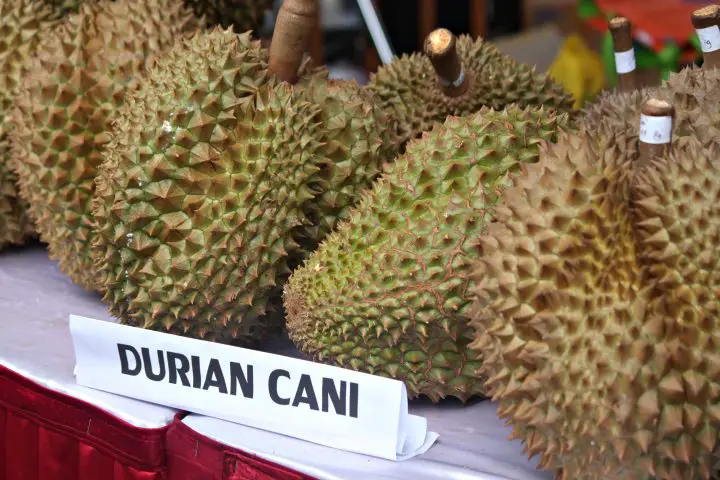
Table of Contents
- What’s Durian?
- Can Dogs Eat Durian?
- Health Benefits of Durian
- Tips for Feeding Your Dog Durian
- What If Your Dog Reacts Badly to Durian?
- Other Precautions to Take While Giving Your Dog Durian
- Picking Healthy Treats for Your Dog
- FAQ
What’s Durian?
Durian has been nicknamed the “king of fruits.” It is native to Southeast Asia, where it can be eaten alone or used to flavor a variety of different foods.
Durian is known for its creamy, custard-like flesh. It can be hard to describe the taste, and many food writers have differing descriptions. But commonly, durian is described as tasting like almonds, caramel, cheese, and garlic at the same time. Though the combination sounds weird if you’ve never had it, lots of people who enjoy this fruit swear that its taste is unmatched. In terms of texture, it’s uniquely creamy and custard-like, making it much different from just about any other fruit.
Even though durian is famously delicious, it is also famous for its pungent and unpleasant smell. Ripe durian has been described as smelling like sweaty socks, onions, rotting meat, and rotten eggs all mixed together. The stench is so powerful that durian has been banned from public transportation and some other public areas around the world. In Singapore, you can even be fined hundreds of dollars for eating durian on the subway!
Despite the off-putting odor, the delicious taste is enough for many people (and dogs!) to enjoy eating the fruit anyway.
Can Dogs Eat Durian?
So we know that dogs will often get excited about durian fruit. But is it good for them?
The answer is yes – when fed in moderation, durian is actually a healthy treat. Of course, there are caveats: some parts of the plant can be toxic.
Here’s what you need to know about offering durian to your pet:
Fruit
The fruit or flesh of the durian is the only part that’s safe for your dog to eat. If you’re cutting through the rind, you’ll probably need a large knife or even a meat cleaver! From there, you’ll need to remove the chunks of fruit from the inside.
The most important thing to remember when preparing durian is to make sure you don’t give your dog any of the rind or seeds. Either one can be harmful to your dog’s health.
Dogs smelling durian for the first time may start to act a little strange. Because of its intense smell, the fruit may prompt your pet to bark, sneeze, or sniff excessively. If your dog doesn’t want to eat the fruit, don’t puh it. A lot of dogs are drawn to its pungent smell, but some find it downright offensive.
Stems/Seeds
Definitely don’t let dogs eat the seeds and stems of durian fruit. The seeds are especially dangerous, as they are known for containing cyanide. You probably already know that cyanide is extremely toxic to both dogs and people. It can even be deadly!
The seeds of most fruits have at least some cyanide in them. So as a general rule, it’s best to avoid feeding fruit seeds to your dog. Some fruits have only trace amounts of cyanide that may not cause serious harm. But since even a little bit of cyanide can make your dog nauseous, do your best to keep fruit seeds out of his diet.
Skin
Giving your dogs durian is safe for the most part, but feeding your pet the skin certainly isn’t!
If you’ve ever seen a durian fruit before, you know that it’s covered in thick spikes. If your dog eats some of the rind, it can get stuck in the gastrointestinal tract and cause irregular bowel movements or even more serious issues. The spikes can even cause lacerations in your dog’s mouth or throat. The rind itself is not toxic, but its spikiness and the fact that it’s hard to chew mean that you should avoid giving it to your dog.
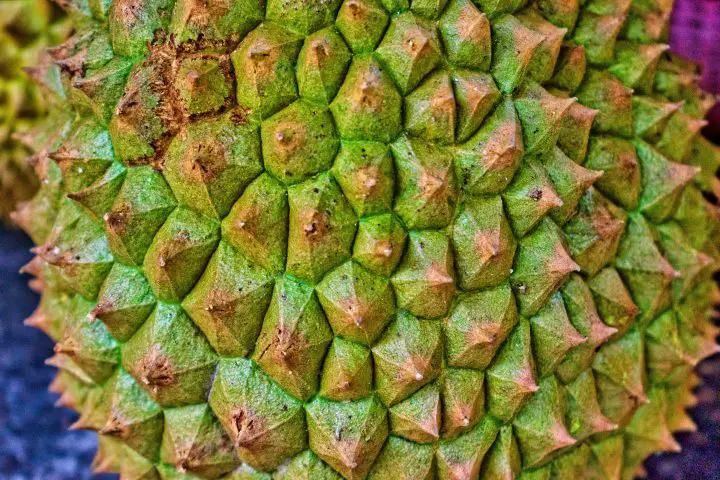
Health Benefits of Durian
When you give your dog durian, you’re offering him a snack that’s rich in nutrients without artificial food flavor, food colorings, or too much salt.
Here are some of the great health benefits that durian can offer your dog:
- It’s rich in antioxidants. The antioxidants in durian can help to neutralize free radicals, cells that increase your dog’s risk of cancer and other problems later in life.
- It’s rich in healthy fats. Though durian has a high fat content, the fats in it can be beneficial to your dog (when they’re fed in moderation, of course). When your dog has enough healthy fat in his diet, his coat will be glossy and healthy. He’ll also have plenty of energy and will certainly feel his best.
- It can reduce cholesterol. Just like with people, high cholesterol can be detrimental to dogs. Durian may be helpful when it comes to lowering cholesterol.
- It can lower blood sugar. Compared to sweeter fruits, durian has a lower glycemic index. That means it doesn’t cause nearly the same rise in blood sugar that most other fruits do.
- It’s an excellent source of potassium. Potassium is one of the most essential electrolytes, and the large amount of potassium found in durian will help ensure a variety of metabolic functions work as they should.
- It contains other helpful nutrients too. Though they aren’t as plentiful as potassium, other key nutrients are in durian. Durian offers your dog folate, vitamin C, magnesium, and phosphorus. It’s also rich in copper and zinc.
- It may help fight infection. Durian can be found in Asian traditional medicine, and scientific studies seem to be backing up its efficacy. Parts of the plant seem to have antibacterial properties.
- It contains fiber. Especially in dogs with digestive issues, fiber is essential. Dogs don’t need a huge amount of fiber, so the bit found in durian can go a long way toward improving their digestive health.
Tips for Feeding Your Dog Durian
Feeding your dog durian is pretty easy. You just need to cut the fruit itself open and scoop out the insides. From there, make sure you remove all the seeds! When you discard the rind and seeds, make absolutely sure that they’re somewhere your dog can’t get to.
If you’re unfamiliar with durian and have never smelled it before, you may want to cut it up outside at first. The smell can be especially overpowering, but lots of people don’t believe just how much it smells until they smell it for themselves!
If you want your dog to get the health benefits of durian but don’t want to go through all the trouble of finding and preparing the fruit, your dog might like dried durian. Dried durian will certainly keep longer, and it usually won’t smell quite as rank as fresh durian.
What If Your Dog Reacts Badly to Durian?
Even though durian isn’t toxic to dogs, some of them may react badly to durian. In some dogs, the fruit might cause stomach pains, bloating, abnormal fatigue, and vomiting.
If you feed your pet too much durian, he might also develop a kind of sugar high and become much more energetic than usual. If that happens, make sure that you give him a little less next time.
While feeding your dog durian, make sure that you keep the seeds far out of his reach. If you’re concerned that he may have eaten some durian seeds, he may be at risk for cyanide poisoning. Be on the lookout for the signs of cyanide toxicity:
- Itchy skin or other skin irritations
- Dilated pupils
- Vomiting
- Shock
- Cardiac arrhythmia
Even if your dog has eaten a large number of durian seeds and doesn’t show any of the above symptoms, it’s important to call your vet immediately! Even if your dog doesn’t yet seem to have an upset stomach or other symptoms, he could still be in danger. Most dogs won’t immediately show symptoms, but prompt veterinary care is essential to save their lives.
Other Precautions to Take While Giving Your Dog Durian
Not every article on durian mentions the fact that eating too much durian can raise blood pressure. In one study, people given 500 grams of durian experienced significant increases in heart rate and blood pressure. Healthy people who ate smaller amounts did not experience changes in heart rate or blood pressure. Though this study was done on people, it’s entirely possible that durian can impact your dog’s heart.
If you follow the recommendation of giving your dog just a small amount of durian, you shouldn’t need to worry about your dog’s blood pressure.
There’s one other thing to keep in mind when feeding durian to your furry friend. Part of what gives this fruit its delicious flavor is its high fat and carbohydrate content. In moderation, there’s nothing wrong with including fat and carbohydrates in your dog’s diet. But too much can cause weight gain, as well as cardiac issues and other weight-associated problems.
If your dog is underweight, durian can actually be helpful in helping him achieve a healthy weight again. But otherwise, make sure to limit how much durian you feed your pet. At most, offer him a few bites a few times a week.
If you’re looking for some guidance on how often you should be giving your dog durian or other treats, most veterinarians recommend that no more than 10% of your dog’s daily calories come from treats or snacks.
Of course, don’t make that 10% come from durian alone! Your dog will benefit from a variety of treats — your veterinarian will also be able to recommend more healthy treats to give your furry friend.
Picking Healthy Treats for Your Dog
Durian dog treats can make your pet’s day. But make sure that, as with all treats, you feed them in moderation. If you want, you can look into some of the tasty human foods that are safe for dogs, too. When in doubt, you can always ask your vet for guidance in selecting healthy treats and snacks.

FAQ
Still not sure about giving your dog durian? Here are some of the most commonly asked questions:
Too much durian can cause weight gain and may elevate your pet’s heart rate to unsafe levels. Try not to give your pet more than a few bites a few times a week. If your dog is underweight and has trouble gaining weight, feeding him a little more may be ok.
Durian seeds can be dangerous to dogs. They contain cyanide, a compound that is potentially deadly. The seeds are hard for a dog’s digestive system to break down, so they have the potential to cause blockages. If your dog eats a durian seed, the best course of action is to call your vet.
Some dog owners suggest giving your dog pineapple juice or adding artificial digestive enzymes to his food. Both of these can speed up digestion. It’s a good idea to check in with your vet to see if these or another remedy would be best for your dog.


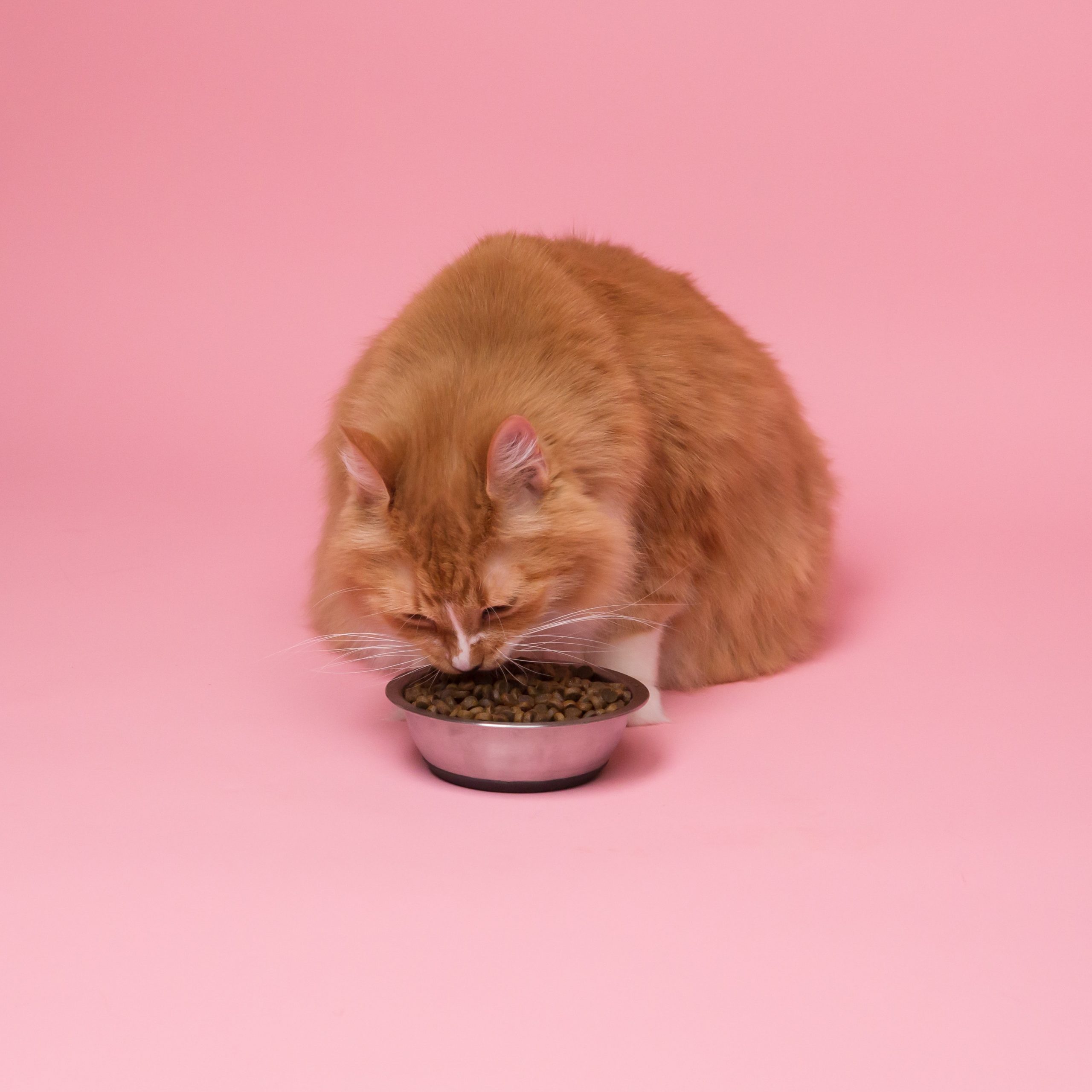
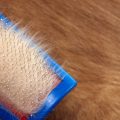
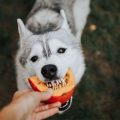


5 comments